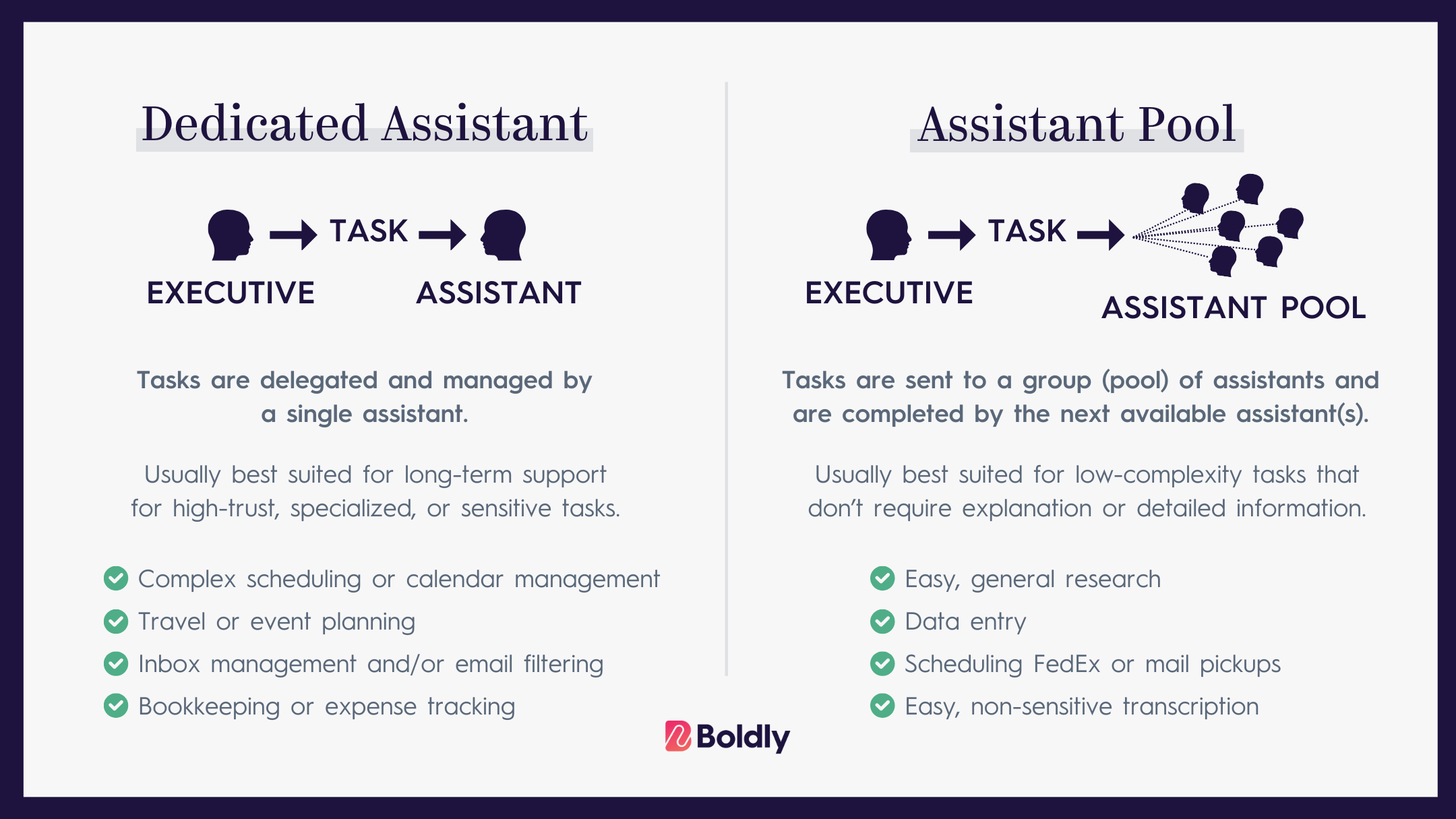With inflation on the rise, every business decision needs to deliver a strong return on investment—including how you manage your time.
Clearing your plate of admin tasks with the help of an executive assistant is a lock for boosting ROI. You instantly increase productivity and add hours back into your day.
The right executive assistant can change your life.
But finding the right assistant is the challenge. A remote staffing service can make it easy, reducing risk and promising a quick start.
There are three main models to consider:
- Dedicated assistants (one assistant for you)
- Pooled solutions (multiple assistants for multiple clients)
- Fractional assistants (one assistant supporting 2-3 executives in your department or organization).
So which solution is best for you?


This article will help you make the right choice by answering 5 key questions:
- What is a dedicated assistant?
- What is a fractional assistant?
- What is an assistant pool solution?
- How to choose which one is right for you
- Which types of tasks are best suited for each model
Let’s boldly define what dedicated assistants, pooled solutions, and fractional assistants are, along with the pros and cons of each.
What Are Dedicated Executive Assistants?
Dedicated assistants aren’t the same as a traditional secretarial pool. They work one-on-one with you providing complete personal support.
While dedicated assistants could technically include traditional in-office hires or freelancers, they typically are a specific remote staffing model that matches one remote assistant directly to one client.
The word “dedicated” doesn’t have to mean full-time. A part-time assistant is still considered a dedicated assistant.
If you choose to go with a dedicated assistant, be sure to read more on the compliance of using remote assistants long-term.
The Pros Of Using A Dedicated Executive Assistant:
- Builds trust and continuity that can be more productive and effective
- Perfect for long-term support
- After they’ve been onboarded, they can pick up and run with most tasks
- Requires less oversight and management
- Best for tasks that require a personalized touch
The Cons Of Using A Dedicated Executive Assistant:
- Can be more expensive than a pooled solution (but still more cost-effective than hiring in-house)
- Depending on the staffing company, if an assistant quits or goes on vacation, you might not have a backup
- Usually overqualified for data entry, one-off tasks, or simple projects
With one-on-one support, the types of assistants vary, ranging from administrative assistants and executive assistants to more specialized support roles.
What Is A Fractional Assistant?
A fractional assistant bridges the gap between dedicated and pooled models. One skilled professional supports 2-3 executives within the same organization, providing consistent support while sharing costs.
This model has grown significantly since the pandemic as companies look for cost-effective executive support. Unlike pools where you work with different people, a fractional EA learns your organization deeply. And unlike fully dedicated assistants, the cost is split between executives.
The key to success? Executives with complementary schedules who can coordinate their needs.
The Pros of Using a Fractional Assistant:
- More cost-effective than a fully dedicated assistant while maintaining consistency
- Develops deep knowledge of your organization and industry
- Provides backup coverage when supporting other executives in your company
- Ideal for executives who need 10-20 hours of support weekly
- Creates built-in trust and knowledge sharing within your organization
The Cons of Using a Fractional Assistant:
- Requires coordination with other executives on scheduling and priorities
- May not be immediately available during busy periods
- Less suitable for executives needing 40+ hours of weekly support
- Works best when executives have similar work styles and standards
What Is A Pooled Solution For Remote Assistants?
A pooled solution, in contrast to a dedicated assistant, uses a group of assistants.
It is from that pool that clients are assigned someone to support specific tasks. This assignment is based on skills or availability.
Administrative assistant pooled solutions are typically less expensive and include access to a dashboard where you can post your tasks instead of sending them directly to an assistant. Once posted, your task can be picked up by any of the remote assistants on the platform.
Pooling means sharing assistants across multiple clients—you post a task, and any available assistant picks it up. This differs from having one assistant support multiple executives within the same organization because that’s more of a fractional executive assistant role than a true pool.
Most assistant pools today rely heavily on outsourcing virtual assistant services, allowing companies to tap into global talent while keeping costs manageable.
The pros of using a pooled assistant solution:
- It’s usually cheaper
- Quick assistance
- Great for easy tasks like data entry
- Perfect for anything that might need 24/7 support (someone in the pool will always have you covered)
- You’re insulated from assistants changing jobs or leaving
The cons of using a pooled assistant solution:
- Quality can vary, especially on more complex tasks
- The assistant doing the work isn’t constant, so you won’t have someone taking the time to get to know your personal preferences
- You may have to spell out and submit every task (whereas a dedicated assistant will usually start to proactively manage things on their own)
- Not recommended for anything that might require sensitive information (bank accounts, social security numbers, etc.)
Using a pooled assistant may sometimes take you more time to explain what you need than just doing it yourself (more on this later).
How To Choose Between A Pooled, Fractional, And Dedicated Assistant Solution
The best way to choose between a dedicated, fractional, or a pooled solution is to think about the type of support you need.
Asking just five simple questions will make it easy to decide:
- Do I need someone for simple, one-off tasks or ongoing strategic support?
- Will I be sharing sensitive information like passwords and financial data?
- Do I have time to explain each task in detail, or need someone who learns my preferences?
- Would I be willing to coordinate with other executives to share an assistant?
- Is immediate availability more important than having the same person handle my tasks?
What you’re determining is whether you need a long-term strategic partner (dedicated assistant), a cost-effective shared resource (fractional assistant), or quick help with simple tasks (pooled solution).
When To Choose A Dedicated Assistant
If you’re looking for someone who can take on more high-trust, specialized, or sensitive tasks, you’ll want a fully dedicated assistant.
You need someone to manage your email inbox or schedule critical appointments with high-value clients. You need someone to book your travel, which requires knowing your travel preferences, traveler ID numbers, payment information, and more.
Because you’re providing access to important information, these are tasks that require genuine trust.
When To Choose A Pooled Solution
If you’re looking for someone who can just take over simple tasks or provide some help now and then with short-term projects you may be fine using a pooled solution.
Handing over low-stakes tasks such as scheduling a FedEx pickup requires no deep insight into your business, nor does it call for extensive training from you. It doesn’t matter who handles the tasks.
Choosing a qualified candidate from a pool is a quick solution that will save you time and money.
When To Choose A Fractional Assistant
If you’re looking for someone who can provide high-quality support but do not need (or want to pay for) full-time dedication.
This model works particularly well for businesses where multiple executives need professional support but the combined workload doesn’t justify multiple hires.
Fractional assistant arrangements excel when executives can share resources efficiently—for instance, when your CFO needs morning support while your COO needs afternoon coverage.
This model has grown significantly as organizations look to maximize ROI on admin support while maintaining quality.
Choose this option if you value consistency and organizational knowledge but have a realistic weekly hours need of 10-25 hours.
What Types Of Tasks Are Best Suited For Each Model?
Pooled Solutions Work Best For:
These tasks share a common trait: they require little to no internal company information and can be explained quickly.
Dedicated and Fractional Assistants Are Great At:
These are high-trust tasks requiring someone who learns your preferences and has ongoing access to important information. The difference? Dedicated assistants handle these full-time for one executive, while fractional assistants manage them across 2-3 executives in your organization.
The Bottom Line On Tasks
Pooled solutions fail when the time to explain the task exceeds the time to do it yourself. If you find yourself writing detailed instructions for every request, you need a dedicated or fractional assistant who learns your preferences once and runs with them.
Finding A Long-Term Solution
If you’re sure you need a dedicated or fractional assistant, consider the experience level and stability you require. While several companies offer experienced remote executive assistants, ensure they can provide a long-term solution.
This is where subscription staffing shines. This model provides support, benefits, and W2 employment to its team, achieving some of the highest retention rates in the industry. That’s peace of mind, knowing your assistant will stick around for years instead of jumping to the next gig.
Starting Your Search For A Remote Assistant
There are a few great places to begin your search for either a pooled or dedicated assistant.
It’s important to understand that most pooled solutions rely on outsourced teams, often spanning multiple time zones to provide 24/7 coverage. While this can offer cost savings (with managed outsourced support commonly starting around $25 per hour for global talent) you’ll want to consider whether having US-based support matters for your specific needs.
Dedicated assistants, on the other hand, may be either outsourced or US-based, depending on the provider you choose.
If you want in-depth reviews of nearly every assistant company out there, one of our favorite sites is virtualassistantassistant.com.
Another good place to research remote assistant solutions is Glassdoor. If you want quality work, you need to choose a company that’s getting the job done. Glassdoor provides ratings and reviews of assistant solutions companies. You’ll be able to see if their clients liked the assistant solution and if their assistants are satisfied, both of which are equally important.
Next, check out the solutions website and see who their other clients are.
Here are six things to look for:
Though the research takes time, it is an essential step before submitting a task or meeting with a representative from any solution in order to protect your valuable time.
The Final Decision: Dedicated and Fractional Assistants vs. Pooled Solutions
So which type of assistant is right for you?
Choose a Dedicated Assistant:
If you’re looking for someone who can take on more high-trust, specialized, or sensitive tasks with your full-time needs.
Choose a Fractional Assistant:
When you need consistent, quality support but can coordinate with other executives and don’t require full-time dedication.
Choose a Pooled Solution:
If your needs align more with a secretarial pool concept, where your tasks are light and don’t require explanation or detailed information.
Remember, you can always switch if your first choice doesn’t work out. Whether you hire executive assistant support through a pool, fractional, or dedicated model, the right remote executive assistant is one of the best decisions modern leaders can make.




